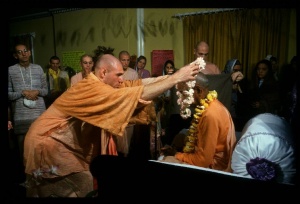CC Antya 2.16: Difference between revisions
m (1 revision(s)) |
No edit summary |
||
| Line 1: | Line 1: | ||
{{ | [[Category:Sri Caitanya-caritamrta - Antya-lila Chapter 02|C016]] | ||
<div style="float:left">'''[[Sri Caitanya-caritamrta|Śrī Caitanya-caritāmṛta]] - [[CC Antya|Antya-līlā]] - [[CC Antya 2|Chapter 2: The Chastisement of Junior Haridāsa]]'''</div> | |||
<div style="float:right">[[File:Go-previous.png|link=CC Antya 2.15|Antya-līlā 2.15]] '''[[CC Antya 2.15|Antya-līlā 2.15]] - [[CC Antya 2.17|Antya-līlā 2.17]]''' [[File:Go-next.png|link=CC Antya 2.17|Antya-līlā 2.17]]</div> | |||
{{CompareVersions|CC|Antya 2.16|CC 1975|CC 1996}} | |||
{{RandomImage}} | |||
==== TEXT 16 ==== | ==== TEXT 16 ==== | ||
<div class="verse"> | |||
<div | :āmbuyā-muluke haya nakula-brahmacārī | ||
āmbuyā-muluke haya nakula-brahmacārī | :parama-vaiṣṇava teṅho baḍa adhikārī | ||
parama-vaiṣṇava teṅho baḍa adhikārī | |||
</div> | </div> | ||
| Line 13: | Line 16: | ||
==== SYNONYMS ==== | ==== SYNONYMS ==== | ||
<div class="synonyms"> | |||
<div | ''āmbuyā-muluke''—in the province known as Āmbuyā; ''haya''—there is; ''nakula-brahmacārī''—a person known as Nakula Brahmacārī; ''parama-vaiṣṇava''—a perfectly pure devotee; ''teṅho''—he; ''baḍa adhikārī''—very advanced in devotional service. | ||
āmbuyā- | |||
</div> | </div> | ||
| Line 21: | Line 23: | ||
==== TRANSLATION ==== | ==== TRANSLATION ==== | ||
<div class="translation"> | |||
<div | |||
In Āmbuyā-muluka there was a person named Nakula Brahmacārī, who was a perfectly pure devotee, greatly advanced in devotional service. | In Āmbuyā-muluka there was a person named Nakula Brahmacārī, who was a perfectly pure devotee, greatly advanced in devotional service. | ||
</div> | </div> | ||
| Line 29: | Line 30: | ||
==== PURPORT ==== | ==== PURPORT ==== | ||
<div class="purport"> | |||
<div | |||
Śrīla Bhaktivinoda Ṭhākura says that Āmbuyā-muluka is the present Ambikā, a city in the Vardhamāna district of West Bengal. Formerly, during the Muslim regime, it was known as Āmbuyā-muluka. In this city there is a neighborhood called Pyārīgañja, and that is where Nakula Brahmacārī used to live. | Śrīla Bhaktivinoda Ṭhākura says that Āmbuyā-muluka is the present Ambikā, a city in the Vardhamāna district of West Bengal. Formerly, during the Muslim regime, it was known as Āmbuyā-muluka. In this city there is a neighborhood called Pyārīgañja, and that is where Nakula Brahmacārī used to live. | ||
</div> | </div> | ||
__NOTOC__ | |||
<div style="float:right; clear:both;">[[File:Go-previous.png|link=CC Antya 2.15|Antya-līlā 2.15]] '''[[CC Antya 2.15|Antya-līlā 2.15]] - [[CC Antya 2.17|Antya-līlā 2.17]]''' [[File:Go-next.png|link=CC Antya 2.17|Antya-līlā 2.17]]</div> | |||
__NOTOC__ | |||
__NOEDITSECTION__ | |||
Revision as of 08:22, 20 September 2021

His Divine Grace
A.C. Bhaktivedanta Swami Prabhupada
A.C. Bhaktivedanta Swami Prabhupada
TEXT 16
- āmbuyā-muluke haya nakula-brahmacārī
- parama-vaiṣṇava teṅho baḍa adhikārī
SYNONYMS
āmbuyā-muluke—in the province known as Āmbuyā; haya—there is; nakula-brahmacārī—a person known as Nakula Brahmacārī; parama-vaiṣṇava—a perfectly pure devotee; teṅho—he; baḍa adhikārī—very advanced in devotional service.
TRANSLATION
In Āmbuyā-muluka there was a person named Nakula Brahmacārī, who was a perfectly pure devotee, greatly advanced in devotional service.
PURPORT
Śrīla Bhaktivinoda Ṭhākura says that Āmbuyā-muluka is the present Ambikā, a city in the Vardhamāna district of West Bengal. Formerly, during the Muslim regime, it was known as Āmbuyā-muluka. In this city there is a neighborhood called Pyārīgañja, and that is where Nakula Brahmacārī used to live.